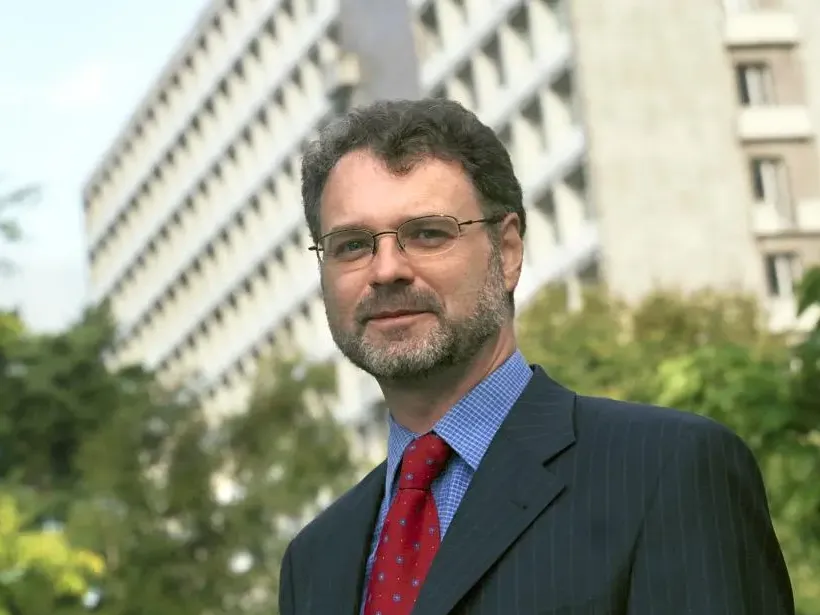4th Contemporary Issues in Financial Markets and Banking
Online conference

The conference seeks to highlight the latest developments which have the potential to change the finance and banking landscape.
- From: Monday 5 January 2026, 9 am
- To: Tuesday 6 January 2026, 4 pm
- Booking deadline: Friday 28 November 2025, 8.00 pm
- Download this event to your calendar
Event details
Welcome to IFMB!
The objective of the conference is to address the emerging gaps within the finance and banking scholarship. The annual conference seeks to highlight the latest developments which have the potential to change the finance and banking landscape.
This is our fourth annual conference, and you can see our previous conference here. You can also check the latest update on our Linkedin page.
“Participating in the 2nd Contemporary Issues in Financial Markets and Banking was astonishing, pushing virtual collaboration and knowledge exchange boundaries. Kudos to the organisers for the flawless execution!”
Christos Kallandranis, Assistant Professor in Finance at University of West Attica, Greece.
The conference is incredibly well attended, featuring submissions (non-exhaustive and in no particular order) from institutions such as Harvard University, Columbia University, Imperial College London, Yale University, the University of Tokyo, University of Maryland, University of North Carolina, London Business School, Pennsylvania State University, Santa Clara University, Baruch College, University of Quebec, Rice University, Rutgers University, Bocconi University, Duke University, Athens University of Economics and Business, University of the Aegean, the Bank for International Settlements, Central Bank of Chile, Central Bank of Ireland, Tilburg University, National Bank of Moldova, McGill University, University of Turin, Deakin University, University of Texas (Rio Grande Valley and Dallas), Laval University, The Hong Kong University of Science and Technology, Hong Kong Baptist University, Hiroshima University, KU Leuven, University of Florida, Bar-Ilan University, University of West Attica, Boston College, Indian Institute of Management (Shillong), Warsaw School of Economics, Polish Academy of Sciences, Yeshiva University, Macquarie University, Cyprus University of Technology, Gutenberg University of Mainz, University of New South Wales, University of Vaasa, Northeastern University, Vilnius University, Universiti Sains Malaysia, Soochow University, and various UK universities (including Edinburgh, Nottingham Trent, Kingston, Leeds, Exeter, Nottingham, Bath, Southampton, Reading, Loughborough, London South Bank, Lancaster, Dundee, Cranfield, Anglia Ruskin, Glasgow, Durham, Glasgow Caledonian, and Roehampton).
Conference Objectives:
- To provide a network platform to bring early career researchers together to form links with experienced academics.
- To establish supportive hubs to allow researchers to discuss the widespread effects of financial crises and the role of sustainable sources of financing to confront current and future economic crises.
- To create a scholarly network to examine the challenges of dynamic decision-making in a business environment fit for the future.
- To discuss the newer puzzles in finance and banking in a supportive and inclusive environment.
Keynote Speakers:
Prof. Morten Bennedsen

Prof. Morten Bennedsen is a Professor of Economics at the University of Copenhagen and a Visiting Professor at INSEAD, where he previously held the André and Rosalie Hoffmann Chair in Family Enterprise for 14 years. He earned his PhD from Harvard University and is a recognized expert in owner-managed and family businesses.
Prof. Bennedsen has authored three book manuscripts, published over 34 articles in leading economics and finance journals, and developed 35 global business cases. He has also contributed more than 250 reports and media articles across six continents.
He writes regular columns in China, Hong Kong, Korea, and Taiwan. He has served as an advisor to the Danish and UK governments, the European Union, the World Economic Forum, private equity funds, and the World Bank. In addition, he frequently gives talks and consults with business families in Europe and Asia.
Prof. Luc Renneboog

Luc Renneboog is a Professor of Corporate Finance at Tilburg University. His research interests encompass a wide range of topics, including corporate finance (corporate governance, mergers and acquisitions, executive compensation, and dividend policy), corporate social responsibility (ESG, ethical investing, and socially responsible investment funds), law and economics (leximetrics), shareholder activism, financial litigation, household finance, health economics, cultural economics, and the economics of art markets.
He holds degrees in Business Engineering (BSc, MSc) and Philosophy (BA) from the Catholic University of Leuven, an MBA from the University of Chicago, and a PhD in Financial Economics from the London Business School (University of London). He also maintains a part-time affiliation with Ghent University.
Before joining Tilburg University, he held faculty positions at the University of Leuven and Oxford University. He has also held visiting appointments at Cambridge University, HEC Paris, London Business School, the European University Institute (Florence), CUNEF Madrid, Cardiff University, and University Paris-Dauphine.
Prof. Renneboog has published extensively in leading academic journals, including the Journal of Finance, Journal of Financial Economics, Review of Financial Studies, Review of Finance, Journal of Financial and Quantitative Analysis, Journal of Accounting Research, Management Science, Organization Science, Strategic Management Journal, Journal of International Business Studies, American Economic Review, European Economic Review, Journal of Law and Economics, Journal of Corporate Finance, Journal of Banking and Finance, Journal of Financial Intermediation, Journal of Business Ethics, Economic History Review, and Emerging Markets Review, among others.
He currently teaches courses on the Economics of Art, Sustainable Finance and Value Creation, and Corporate Finance at the PhD level.
Prof. Luigi Zingales

Luigi Zingales is the Robert C. McCormack Distinguished Service Professor of Entrepreneurship and Finance at the University of Chicago Booth School of Business. His research spans corporate governance, financial development, political economy, and the cultural dimensions of economics.
He is the co-developer of the Financial Trust Index and currently serves as a research fellow at the National Bureau of Economic Research (NBER), the Centre for Economic Policy Research (CEPR), and the European Corporate Governance Institute (ECGI). A past president of the American Finance Association (2014), he also directs the Stigler Center at Chicago Booth, where he leads initiatives on regulatory capture and the influence of special interests in capitalism.
Zingales co-hosts the podcast Capitalisn’t and has published in leading economics and finance journals, as well as in Science and PNAS. He was awarded the 2003 Bernácer Prize as the best young European financial economist. His influential books include Saving Capitalism from the Capitalists (with Raghuram Rajan) and A Capitalism for the People, both praised by the Financial Times and National Review.
A passionate advocate for reform and civic responsibility, Zingales is known for his distinctive teaching philosophy and global outlook. Born in Italy, he earned his bachelor's degree in economics from Bocconi University and his PhD from MIT before joining Chicago Booth in 1992.
Prof. Klaus Schaeck

Klaus Schaeck is Professor of Banking and Finance and Head of the Banking Research Group at the University of Bristol Business School. He also serves as Associate Editor of the Journal of Money, Credit, and Banking. His research focuses on the empirical modelling of bank behaviour, with particular emphasis on regulation, supervision, and government intervention in banking. More recently, his work has expanded to include climate-related financial risks and the role of banking supervision in the transition to a net-zero economy.
His research has been published in leading journals such as the Review of Financial Studies, Journal of Financial and Quantitative Analysis, Journal of Financial Intermediation, and Review of Finance. He has presented at major conferences including the AFA, EFA, SFS Cavalcade, and various central bank forums, and is a frequent contributor to the Financial Intermediation Network of European Studies (FINEST).
Klaus maintains strong ties with policy institutions, having consulted for the European Central Bank, World Bank, Deutsche Bundesbank, and the International Monetary Fund. He was also awarded the ECB’s Lamfalussy Fellowship. His research has been cited in influential policy reports and widely featured in media outlets such as the Financial Times, BBC, CNBC, Forbes, and Vox.com.
He has received research funding from the Leverhulme Trust, the British Academy, and other leading funding bodies. At Bristol, he founded the MSc in Banking, Regulation and Financial Stability and co-organises the annual Bristol Workshop on Banking and Financial Intermediation. In collaboration with Durham University, he co-founded the Durham-Bristol Banking Policy Forum, which, since 2024, has been held with support from the International Banking Research Network and Tandem Bank.
Publication Opportunities
The Financial Review Journal (ABS3)
The Conference Organising Committee is pleased to announce that several papers presented at the conference will be considered for publication in The Financial Review (FR) (ABS3*). These papers will undergo a blind peer-review process.
This opportunity follows a 'no-fault' submission policy: if The Financial Review decides to review but ultimately reject a paper, the author(s) may resubmit it through the journal’s standard submission process. Please note that submitted papers must not be under review by any other journal.
A submission fee of USD 175 applies. However, selected papers may receive financial support from the Conference to cover this fee. Additionally, The Financial Review and the Eastern Finance Association (EFA) have agreed to sponsor the conference’s Best Paper Award. As part of a special arrangement between FR, EFA, and the Conference Organising Committee, a submission fee waiver will be granted for up to three submissions.
We are also actively pursuing Special Issues or Sections with other reputable journals and will announce further publication opportunities in due course.
Registrations and Paper Submissions:
- Interested participants should register for the conference using the following form and then proceed with the process below:
- After registration, you should receive an email that provides access to the conference's SharePoint site. Once logged in, participants can submit their papers to be reviewed by the scientific committee.
- If the paper is accepted after review, participants will be informed of the outcome via email. The paper will be allocated a presentation slot (via Microsoft Teams) in the relevant session depending on the topic on the day of presentation. More details on the presentation will follow nearer the presentation dates.
- Participants will then proceed to make a payment of £100 for doctoral students or £150 for regular submission before they can attend or present at the conference. This payment will also grant access to all conference materials (e.g., submitted papers and recorded presentations) for one month after the conference.
- The conference is also open to anyone who wishes to access the presentations and papers but does not wish to submit any papers.
- The submission should be a fully developed manuscript. We do not impose any style requirements.
- After the conference proceedings, we will also announce the Best Paper Award.
Important Dates:
Deadline for paper submissions: 3 October 2025
Deadline for payment: 28 November 2025
Deadline for requesting changes to presentation slots: 12 December 2025
Deadline for submitting presentation and discussant slides: 30 December 2025
Conference dates: 5 to 6 January 2026
Topics:
The scientific and organising committee welcomes submissions in all areas of banking and finance presentation at the conference. Early submission is highly encouraged, and the decision is made as soon as the review is complete. The main topics of the conference include:
Financial resilience; Green and sustainable finance; Decentralised finance and disruptive financial technologies; Theoretical asset pricing; Empirical asset pricing, liquidity and behavioural economics and finance; Risk management; Financial inclusion; Alternative investments; Crowd-funding; Islamic banking; Banking and financial sector stability and regulation; Financial (dis)integration and Brexit; Artificial intelligence, machine and deep learning applications in finance; Corporate finance and sustainable energy financing; Crisis investment and portfolio management; Corporate governance; International financial management and investment; Market microstructure; Household finance; Real estate and property markets; Metaverse and Blockchain technologies in finance. Intersection between finance and economic theory, especially financial applications of game theory, decision theory, and computational financial economics (including multi-agent models and econophysics); experimental economics with implications for financial theory and practice.
For queries, please send an email to ifmb@ntu.ac.uk
FAQs:
Q: Is the conference online or onsite?
A: The conference is completely online.
Q: I am a PhD student. Can I submit my work to the IFMB 2025 conference?
A: We welcome work from researchers, practitioners, academics and PhD candidates.
Q: How do I submit and track my paper in SharePoint?
A: There is a section on the home page for you to submit/upload your paper for review. Please start there and follow the on-screen information.
Q: Can I appeal the outcome of my paper review?
A: All decisions from the review process are final.
Q: Can I present more than one paper at the conference?
A: No, you can’t present more than one paper at the conference.
Q: What is my Paper ID?
A: There is a section on the SharePoint home page for you to track your submission. After your paper is uploaded, it should appear there with a Paper ID.
Q: Why can’t I access the conference materials?
A: The conference materials include all submitted papers and recorded presentations. Access will be available upon payment of the registration fee.
Q: If there is more than one presenter for the conference, should the other presenters need to pay for the conference fees?
A: Yes, all presenters will need to pay the conference fees. The payment will enable us to add them to our system and give them access to all our conference materials.
Q: Once the discussant has completed their PowerPoint slides, where and how to upload them?
A: Please send both the presentation slides and discussion slides to ifmb@ntu.ac.uk.
Q: How to access the recordings of sessions after the conference?
A: All the recordings will be uploaded to Sharepoint.
Q:Tell me more about the Best Paper Award
A: The organising committee will select the best paper and award the certificate to the presenting author.
Q: Is there any fee waiver for the publication opportunities?
A: The organising committee will invite shortlisted papers to submit to the journals. The invitation will include information about fee waivers (if any).
Q: Are all papers submitted to the conference eligible for shortlisting for Special Issues/Sections/Collaborations?
A: Yes. If you do not wish for your paper to be considered for shortlisting in these journals, please let us know by contacting us by email at ifmb@ntu.ac.uk when submitting your paper.
Programme Organisers:
Thong Dao, Nottingham Trent University, UK
Yassine Essanaani, Nottingham Trent University, UK
Padmi Nagirikandalage, Nottingham Trent University, UK
Thao Nguyen, Nottingham Trent University, UK
Jeremy Cheah, Nottingham Trent University, UK
Linzhi Tan, Nottingham Trent University, UK
Sercan Demiralay, Nottingham Trent University, UK
Mehmet Sahiner, University of Dundee, UK
Florian Biermann, Nottingham Trent University, UK
Kenneth Baldwin, Nottingham Trent University, UK
Athanasios Tsekeris, Glasgow Caledonian University, UK
International Scientific Committee and Collaborators:
Prof. Duc Khuong Nguyen, Ipag Business School, France
Prof. Tapas Mishra, University of Southampton, UK
Prof. Van Son Lai, Laval University, Canada
Prof. Paul McGuinness, University of Sheffield, UK
Prof. Osamah AlKhazali, American University of Sharjah, UAE
Prof. Sabri Elkrghli, Libyan International Medical University, Libya
Prof. Serkan Cicek, Muğla Sitki Kocman University, Turkey
Prof. Jiguang Huang, Anhui University of Finance and Economics, China
Associate Prof. Sofia Johan, Florida Atlantic University, US
Prof. Hung Do, Massey University, New Zealand
Prof. Tam Nguyen, Nottingham Trent University
Associate Prof. Shan Wu, Xi'an Jiaotong Liverpool University, China
Dr. Mamata Parhi, University or Roehampton, UK
Dr. Toan Huynh, Queen Mary, University of London, UK
Assistant Prof. Destan Kirimhan, American University of Sharjah
Assistant Prof. Maher Khasawneh, Hashemite University, Jordan
Prof. Alper Kara, Brunel University, UK
Prof. Ugur Soytas, Technical University of Denmark, Denmark
Associate Prof. Samet Gunay, Corvinus University of Budapest, Budapest
Associate Prof. Erhan Kilincarslan, University of Huddersfield, UK
Assistant Prof. Suliman Alshahmy, Heriot-Watt University, UAE


